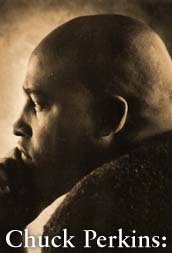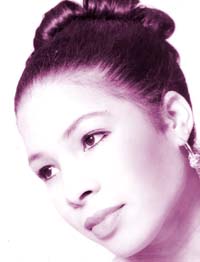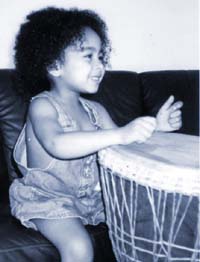
written poetry
performance on video
audio poetry
autobiography
credits & contact
Biography
I was born in 1965 in New Orleans, Louisiana, to Charles and Gail Perkins. I have three brothers, one of whom is my twin, and a sister. My father and grandmother sharecropped when he was a child. My father grew up always cognizant of race in the Deep South, and his family was aware of it, too.
The first poetry album I ever heard was Rappin Black in a White World by an LA group called Watts in Prophets. I found it by looking through my aunt's albums from the sixties. This album encouraged me to write poetry and led me to my first book of poetry, Black Voices. When my aunts talked about coffeehouse poetry in the sixties, I used to wonder about how great it would be, to be able to write poetry and have people willing to listen.
Kwame Toure (a.k.a Stokely Carmichael), who recently died, is my favorite activist. I heard him lecture several times and I got to talk with him once. He suggested that I read as much as I can. One of the poets I discovered was Gil Scott-Heron, the performance poet who inspired me. He put his poetry to music and has been received well by radio audiences who typically listen to R&B. My favorite Gil Scott song is "Winter in America". I saw Gil Scott perform in San Francisco in 1993. He did a song about Fanny Lou Hamer. Ms. Hamer was a civil Rights activist whom I had not heard much of. I purchased her biography. I happened to finish the book while on a plane headed to New Orleans. I was so inspired, I cried as I read the last page, and eventually wrote a poem about her.
I am a product of New Orleansí inner city public school system. Students who attended my school intent on learning did, but those students who went to school looking for something other than education found it as well. I began to write my first poetry in the tenth grade. Sometimes the teachers would call me in front of the class and let me recite two or three poems. The first poem that I wrote was called Mardi Gras. It was an angry poem that dealt with the rude treatment of black teenagers by the police.
I always had the ability to excel in school, but I had an affinity for playing a little across the line. I was a complex teenager who felt at home housing schoolyard dice games or leading discussions in history classes. I played linebacker on the high school football team. But once I drank some cheap wine before a game and on one play I was injured in three different places.
Hickory and Leonidas was a notorious intersection, four blocks from my home. It was drug infested, and all of the violence associated with drugs was there. Fortunately for us, we lived across the street from a playground supervised by Mr. Mims, who was a second father to at least about 50 kids who played on the park regularly. My mother and father allowed us to play in the park everyday until the park lights were turned out about 10 oíclock, but they did not want us anywhere near Hickory and Leonidas. As soon as my parents were out of sight, that was the first place I went. Through my teenage years, my parents were afraid for me. I never did anything to severely cross the line, but I remember my mother telling me once that she thought I would be her only son to ever go to the penitentiary.
 my wife, Andrea | |
I graduated from high school in 1983, and I was afraid and uncertain about what I wanted to do, so I joined the Marine Corps for three years. In the Marine Corps, I continued to write poetry. Many of the guys in my platoon would get me to write poems for their girl friends. After working hours, most guys went to the enlisted club to drink. There were hardly any women around so I went back to my room to be alone most times. I spent a lot of time there thinking about the world and I became very serious about everything.
I was aboard ship on the Mediterranean Sea for six months. There are only so many days where you can play cards until you are sick of it. I went to the shipís library where I happened upon the book From Slavery to Freedom by John Hope Franklin. When I finished reading that book, I felt as if somehow my life had changed. If I had to do it all over again I would, but the Marine Corps wasnít an easy ride for me. There were fundamental differences between who I was and what the Marine Corp was. While my writing has only began to flourish over the last 7 years I believe that I have always had the soul of a writer. And for a writer, finding his own voice is critical. There is no substitute for individuality. In the Marine Corps, being an individual is almost as bad as treason.
I took an English class while aboard ship. The class was given by an older white English professor from San Diego State University. He was paid to come aboard ship and teach classes, and he got the opportunity to see the world, no charge. I remember talking to him once about some of the difficulties I was having. I expected him to say that I should hang in there and work hard and that things would improve. He instead leaned over and whispered that he was glad to hear me say what I said. He went on to say that my indivuality was important and that I would need it after the Corps. That conversation did a lot in helping cope with those very trying times.
I got out of the Marine Corps in January of '87. By February of '87 I got a job at the Windsor Court Hotel in house cleaning. This was not at all how I had imagined things, mopping floors and scrubbing walls. This was a five star hotel, and some of the condescending looks from the guests were painful to take. Room service paid minimum wages and the managers avoided paying overtime. This lead me to get a second job as a doorman in an up-scale condominium. I worked seven days a week and on four of those days I worked at least 17 hours.
I enrolled at Xavier University for the fall of '88. By this time I had moved from house cleaning to room service. This job involved tips and I was able to quit the doorman job. I worked at the Windsor Court until I graduated from college 4 Ĺ years later. For the most part, college kids waited tables, and those people who were seen as discards ended up scrubbing floors or washing pots. Most times there was a division between the people doing these jobs. While I was becoming a part of the college group, the people around the hotel doing the more menial jobs trusted that I saw myself no different from them, and this trust allowed them to ask me for help from anything ranging to advice about a boss who was being unfair, to teaching one guy to read. The class lines were clearly drawn at the hotel.
As college progressed I again found the middle ground that I had lost in the Marine Corps. I took my education seriously, but really living life became important as well. I had always been aware of racism but Xavier taught me even more about Classism. My first year in college was a little difficult getting adjusted to. This was my first time being around black kids whose parents were doctors and lawyers, basically living like the Huxtables, and for the most part I had been accepted by the more popular students at the school. I did however see that just being black wasnít always enough. I graduated in 1992 and accepted a job in Dallas. This job eventually moved me to Amarillo, Texas, and then to Chicago.
Chicago is where my poetry really began to grow. I met some fabulous poets like Marc Smith, Sheila Donahue, Regie Gibson, Kent Forman, Tony Crooks and Tyhemba Jess. Reggie Gibson and Tony Crooks were two of the first poets I met. I immediately respected their work, and we spent time bouncing things off each other over eggs at two in the morning at various greasy spoons around Chicago.
 my daughter, Clarke | |
Sheila Donohue and I were team members on the Chicago slam team that went to Portland in 1996. We have been very good friends every since. Sheila and Greg Scott, her husband, were very instrumental in bringing my CD to life.
I married my college sweetheart Andrea Serino in 1995. We had our first child, Clarke Indira Perkins, in 1995. We're eagerly waiting the arrival of Summer Indigo Perkins in February 2001.
- Chuck Perkins, January 2001
home | written poetry | performance on video | audio poetry | autobiography | credits | further website info copyright © 2000-2011, Chuck Perkins and e-poets network |